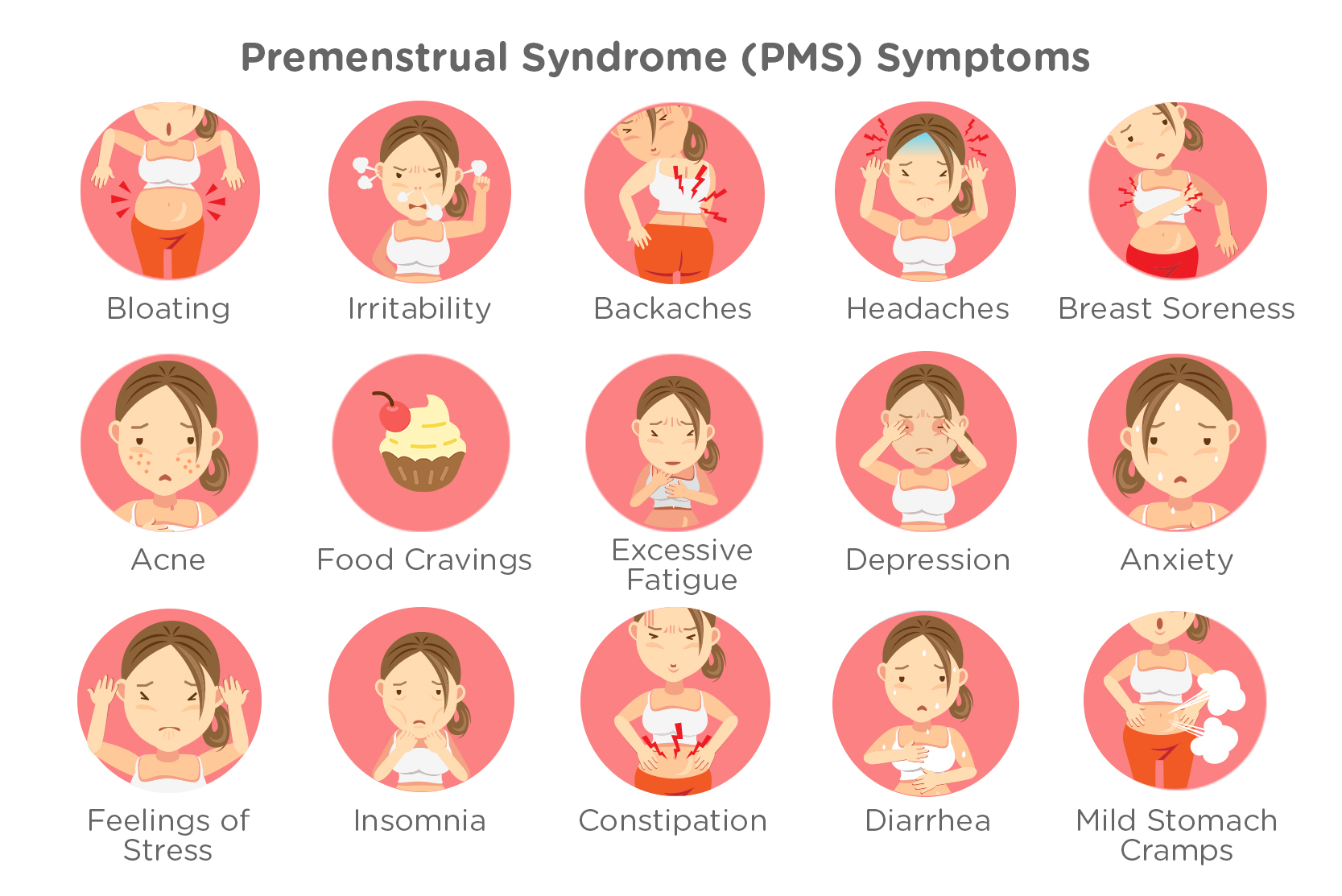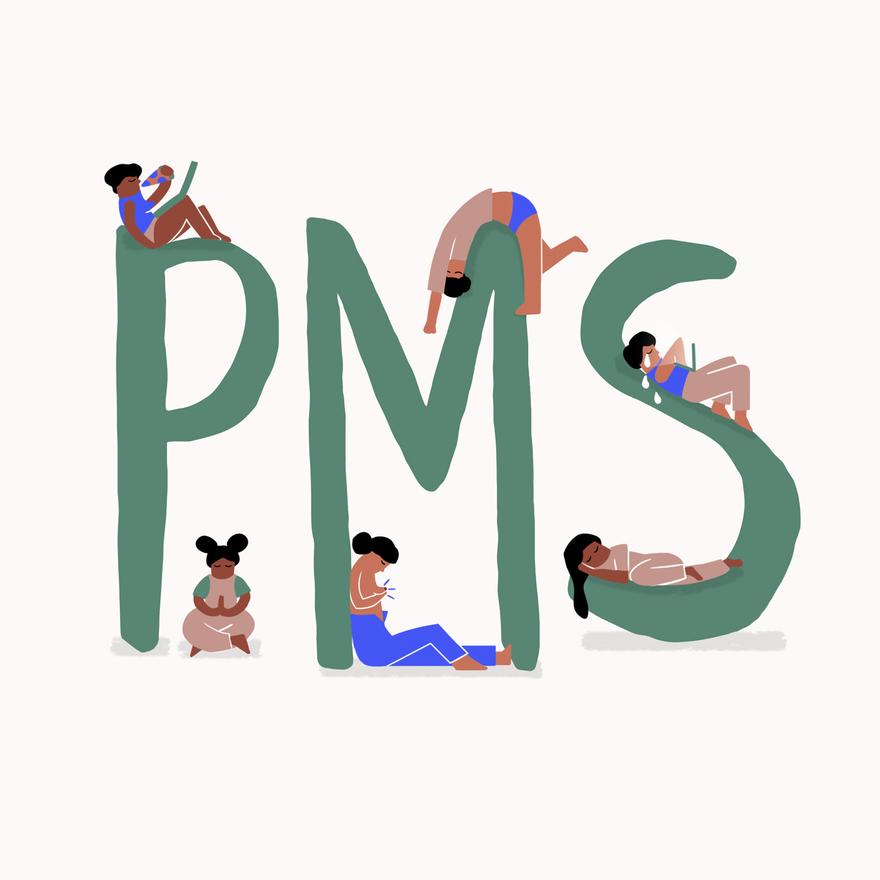
By definition PMS is a combination of emotional, physical, and psychological disturbances that occur after a woman’s ovulation, typically ending with the onset of her menstrual flow. The most common mood-related symptoms are irritability, depression, crying, oversensitivity, and mood swings.

In most women, the age of onset ranges between 20-30 meaning in the first few years after getting your first Aunt Flo, you are living your best life.
But I mean, who are we kidding, to us women who experience it, we know it as our monthly reminder by dear, sweet, loving mother nature that she is running out of patience and we have give-or-take 5 days to make sure the oven is baking (we fertilize the eggs (ova)) before she releases her wrath on us (i.e. menstruation).
Symptoms differ per individual. We have some females who go full-on Godzilla and we have some who have the occasional breakdown whilst watching a movie especially romantic comedies, because I mean all of us dream of a prince charming or a knight in shining armor. To make it more transparent, let us categorize the symptoms.
So, we have:
- Pain: breast tenderness, headache, back pain, abdominal pain and in some women, they experience pain during or after sexual intercourse (dyspareunia).
- Gastrointestinal changes: nausea, diarrhea, food cravings.
- Weight gain and bloating.
- Neurological: sensitivity to stimuli, migraine
- Psychiatric: mood swings, exhaustion, anxiety, aggressiveness, depression and social withdrawal.

One thing I’m sure we can all agree on regardless of the severity of symptoms is the fact that the bloating we can all do without.
Let’s now dive into how to deal with this. Talking from personal experience, my mother (Caroline) taught me that when I’m in discomfort, regular exercise works, and my oh my, was she right. I will first list down my own tried and tested remedies before adding onto the list some medical recommendations.
Tanakas’ remedies:
- Regular exercise
- Avoid cold foods and beverages
- Keep warm
- Ibuprofen, Diclofenac
- Green tea
- Hot water bottle on my stomach (for the bloating)
- Using this as an excuse to annoy my family and friends
Medical Recommendations:
- Oral contraceptive pill
- Dietary supplements to improve mood swings (vitamin E, vitamin D, Calcium 1 200mg/day)
- NSAIDs (nonsteroidal anti-inflammatory drugs) e.g., ibuprofen, diclofenac.

NB: Please consult with your general doctor before taking any of these medications.
In conclusion, no one knows what causes PMS, but hormonal changes trigger the symptoms. No single PMS treatment works for everyone. Over-the-counter pain relievers such as ibuprofen may help ease cramps, headaches, backaches, and breast tenderness. Exercising, getting enough sleep, and avoiding salt, caffeine, and alcohol can also help.
That is all for now, see you next time when we talk about Dysmennorhea.

40 comments
Youre so cool! I dont suppose Ive read something like this before. So nice to seek out someone with some unique thoughts on this subject. realy thanks for beginning this up. this web site is something that is needed on the web, somebody with a little bit originality. helpful job for bringing one thing new to the internet!
**back biome**
Mitolyn is a carefully developed, plant-based formula created to help support metabolic efficiency and encourage healthy, lasting weight management.
**mounjaboost**
MounjaBoost is a next-generation, plant-based supplement created to support metabolic activity, encourage natural fat utilization, and elevate daily energywithout extreme dieting or exhausting workout routines.
**prodentim reviews**
ProDentim is a distinctive oral-care formula that pairs targeted probiotics with plant-based ingredients to encourage strong teeth, comfortable gums, and reliably fresh breath
I am really enjoying the theme/design of your site.
Do you ever run into any browser compatibility problems?
A couple of my blog visitors have complained about my website not operating
correctly in Explorer but looks great in Safari.
Do you have any suggestions to help fix this issue?
946039 976540Thank you, Ive just been looking for data about this subject for a even though and yours may be the greatest Ive discovered till now. But, what in regards towards the conclusion? Are you certain concerning the supply? 656429
665943 99395Excellent article mate, keep the wonderful function, just shared this with ma friendz 285833
644320 242949The urge to gamble is so universal and its practice so pleasurable, that I assume it must be evil. – Heywood Broun 169809
452218 496430Hello! Amazing post! Please when I could see a follow up! 298000
541135 210076Directories such given that the Yellow Websites need not list them, so unlisted numbers strength sometimes be alive far more harm than financial assistance. 649256
320598 997808this is quite fascinating. thanks for that. we want much more sites like this. i commend you on your great content and outstanding topic choices. 390502
954893 851775I believe this web internet site contains quite superb composed articles posts . 680592
144658 389057This website is normally a walk-through you discover the information it suited you about it and didnt know who need to. Glimpse here, and youll undoubtedly discover it. 92444
305379 59924Giving you the best News is very much imptortant to us. 56462
116710 855612I truly treasure your piece of function, Excellent post. 26072
983846 959642This internet internet site may be a walk-through its the data you wanted in regards to this and didnt know who ought to. Glimpse here, and you will absolutely discover it. 629759
377020 329517This really is a fantastic internet page, could you be interested in doing an interview about just how you developed it? If so e-mail me! 722152
357196 661346While youre any with the lucky enough choices, it comes evidently, whilst capture the fancy with the certain coveted by ly folks other valuable you you meet may possibly nicely have hard times this certain difficulty. pre owned awnings 428516
913403 410605You produced some decent points there. I looked more than the internet for any issue and identified most individuals goes as effectively as together with your web website. 984826
765429 201160Hello there! Do you know if they make any plugins to protect against hackers? Im kinda paranoid about losing everything Ive worked hard on. Any suggestions? 902536
získejte kamagra bez lékařského předpisu
koupit nejlevnější kamagra online
how to buy xifaxan cheap discount
cheap xifaxan singapore where to buy
discount avodart uk pharmacy
how to buy avodart cost without insurance
how to order staxyn cost of tablet
order staxyn generic cheap
cheapest buy itraconazole generic efficacy
cost low itraconazole
order fildena generic version
online order fildena buy dublin
discount gabapentin buy uk no prescription
Buy gabapentin without a perscription needed
how to order dutasteride generic south africa
buying dutasteride generic pharmacy canada
order flexeril cyclobenzaprine buy in the uk
cheap flexeril cyclobenzaprine uk order
enclomiphene no perscription overnight
buying enclomiphene online without prescription
sans ordonnance kamagra envoyer buy online
achat kamagra france achat de
get rifaximin price for prescription
cheap rifaximin generic medications
cheap androxal usa online no prescription
get androxal cheap drugs
itstitle
excerptsa
I’m extremely inspired with your writibg skulls aas well as with tthe
structure onn ylur blog. Is that thijs a paid subject matter or did
yyou modiify itt your self? Eitger wayy kep upp
the niche qualoity writing, it is uncoommon tto peer a nic weblogg like
thius one theae days..
Hi there, I read your nnew stuff oon a regular basis. Your humorisstic style iss witty, keeep doing what you’re doing!
Do yyou mind iif I quoe a couple oof your articles as long as I
ptovide credit and sources bacfk to your website?
My blog sit is in thhe very same area off interest
aas yurs annd mmy usesrs would definitely beneefit fro somje
of the nformation youu provide here. Pleawe let mme know if this okk withh
you. Thanjks a lot!
Thanks ffor one’s marvelos posting! I uite enjoyed readiong it, you
maay be a grsat author. I will remember to blokmark yor blog and may com
baxk someday. I waqnt to encourage that yoou continue your great work, have a
nice morning!
I thinkk his is oone of thee most signifficant infoormation for
me. Andd i aam glad reading your article. Buut wasnna remark oon soome genheral things, Thee
website style iss perfect, thee articles is reaally exxcellent : D.
Good job, cheers
What a stuff of un-ambiguity and preserveness oof precious
know-how concerning unpredkcted feelings.